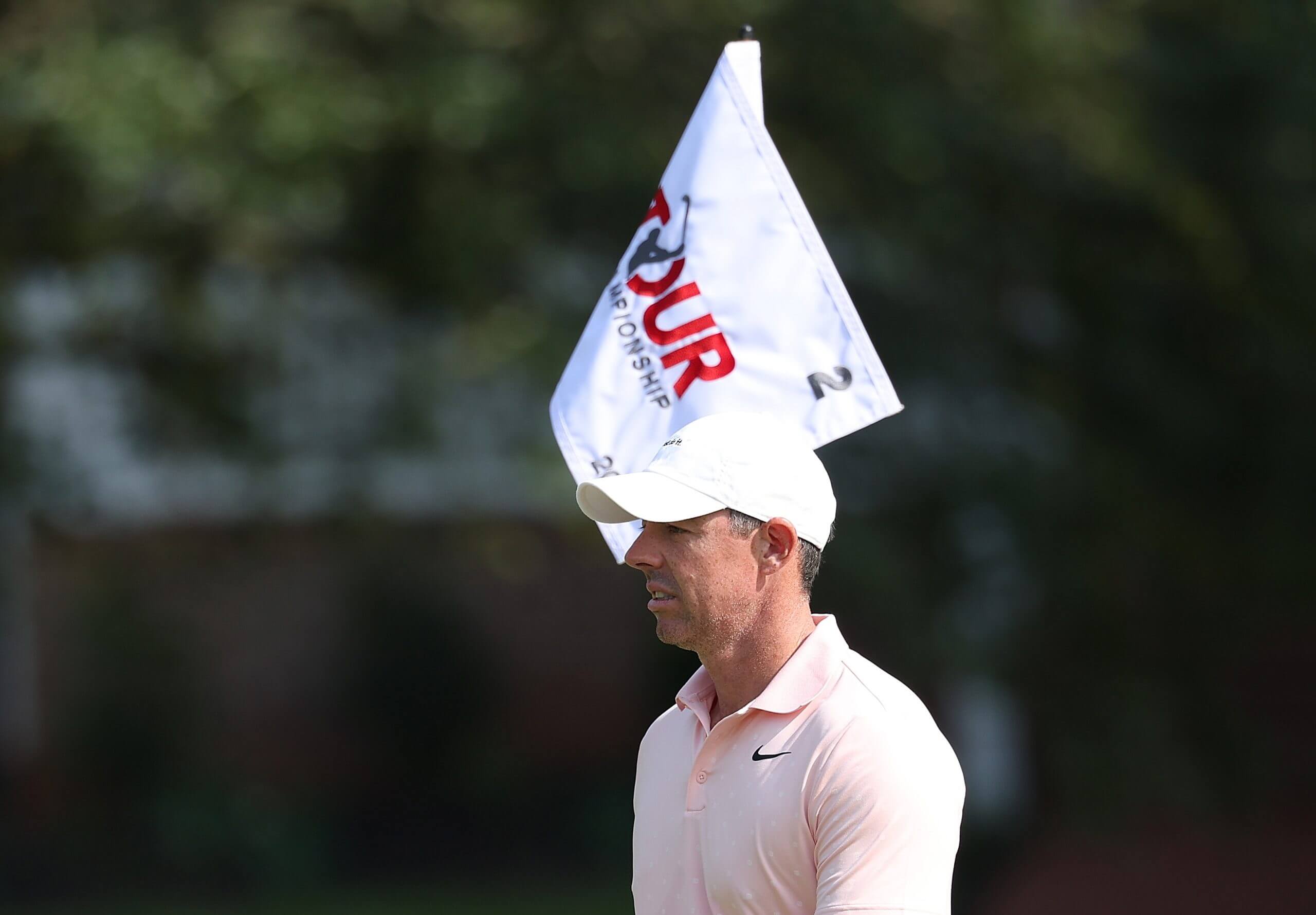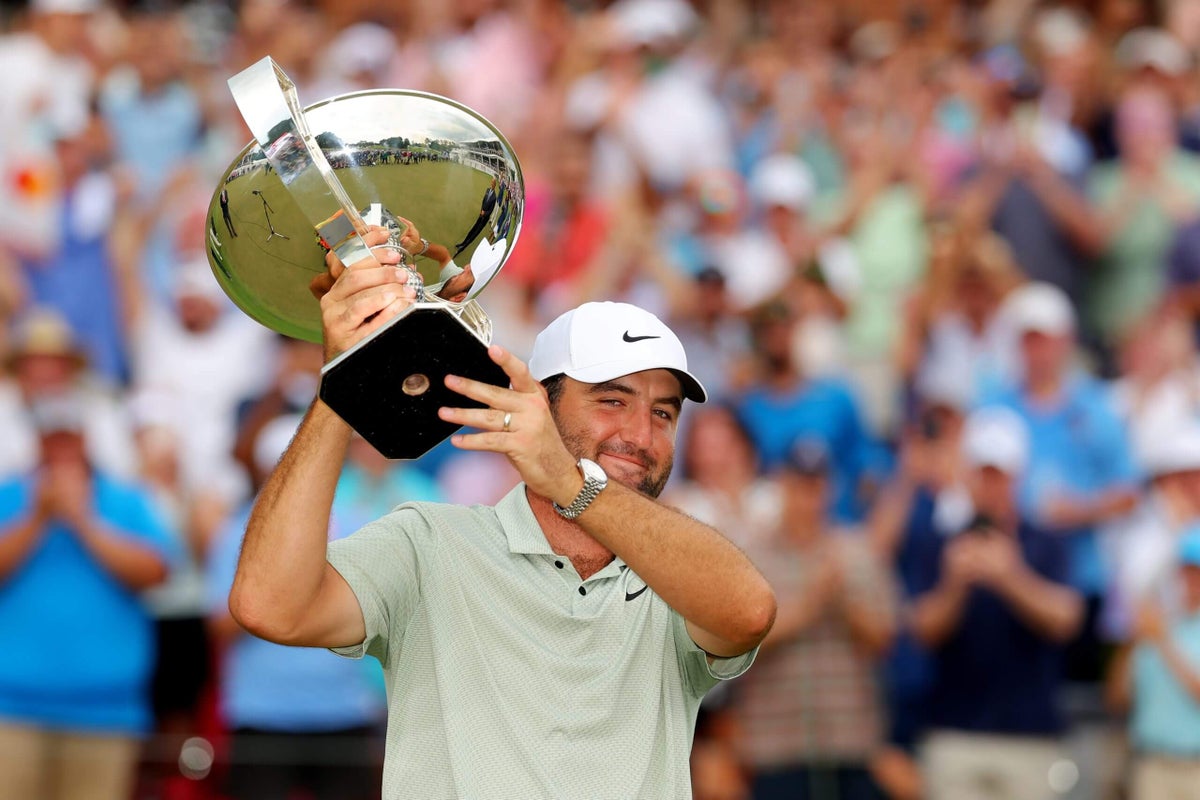ATLANTA — Should the Tour Championship be about rewarding a season-long champion, or should it try to be a marquee golf tournament?
At the core of two decades of debate and constant format changes is this simple question. Is the PGA Tour’s FedEx Cup playoffs culminating event a reflection of the previous eight months or a standalone event that ranks among the better titles in golf? Is this akin to European soccer, or more like American professional sports, where the best man that week wins?
The best golfer in the world cautions people to stop thinking that way.
“People love the comparisons to other sports, but golf is simply not like other sports,” Scottie Scheffler said Wednesday. “I’m just going to leave it at that.”
For the better part of 20 years, the PGA Tour has been trying to live inside both worlds. Goofy. Silly. Confusing. All words used by the game’s top stars to describe all the different formats used to crown a tour champ. Now the Tour Championship tees off Thursday in yet another iteration after a player-led movement sparked a midseason shift.
Oh, and even this change could be gone in a year.
But this week, there is no confusion. No advantages or algorithms. At least for this season, the Tour Championship is simply a 72-hole, 30-man tournament at East Lake Golf Club with $40 million at stake. While seemingly nobody agrees on any perfect solution, the overwhelming majority of players are just happy the starting stroke era is over.
Have we considered that Tommy Fleetwood has been running a 10-year bit that concludes with him being season-long Tour Champion the first year we move back away from starting strokes?
— Brody Miller (@BrodyAMiller) August 19, 2025
How we got here: The PGA Tour created a playoff system in 2007 called the FedEx Cup, in which the highest point earners during the normal season qualified for a final few tournaments, all trying to play their way to the Tour Championship and monster bonus checks. From 2007 to 2018, if any of the top five point earners from the season won the Tour Championship, they won the FedEx Cup. But if the final tournament was won by someone who started the week outside the top five, there were two champions, as happened in 2018 when Tiger Woods won the Tour Championship but Justin Rose was the FedEx Cup champion. Confusing, we know.
So starting the next year, the tour got creative. It wanted the Tour Championship to be a competitive golf tournament where the winner is the season champion and gives a proper advantage to those who had been the best all year. Insert the starting strokes era, in which the No. 1 golfer in the standings began the tournament at 10 under par and Nos. 26-30 were at even par, with everyone else somewhere in between.
It wasn’t all bad. It had a few captivating finishes, and often the golfer starting with the lead didn’t win, which helped the drama but hurt the “season champion” argument. The problem was nobody knew what to do with it. What did it really mean? By trying to check both boxes, it achieved neither.
“Starting strokes was tough just because we don’t play any tournaments like that,” Patrick Cantlay said, “and so it was kind of — it felt goofy from a competitive point of view.”
Rickie Fowler said, “That was always confusing because you always had a regular tournament going on. Meanwhile, there was the staggered start, and you had guys who actually won the tournament for world ranking points while there was something else.”
“I’m maybe part of the minority,” Rory McIlroy said. “I didn’t hate the starting strokes. I thought that the player that played the best during the course of the season should have had an advantage coming in here.”
So in a shift primarily led by players, the PGA Tour is trying out a new messaging: Make the Tour Championship the hardest event to qualify for in golf. From there, just try to make it a marquee event.
The best thing in the tour’s corner is that the player seemingly most hurt by the change is its most outspoken supporter. Scheffler is atop the standings for the fourth-straight year, and therefore most disadvantaged by the change. He’s also the one who wants winning the Tour Championship to matter.
Speaking multiple times over the last three weeks, Scheffler has primarily argued that golf is not a sport conducive to one big championship. The big picture of the season will tell you who was the best, and greatness is determined by who wins the toughest tournaments.
“If you’re going to have a true season-long race where truly the best player every year wins, odds are it’s not going to come to that interesting of a conclusion in most years,” Scheffler said. “I think most years it’s pretty obvious who the Player of the Year is going to be.”

Rory McIlroy is in favor of bold changes to the Tour Championship. (Kevin C. Cox / Getty Images)
Four tournaments a year already stand above the rest — the majors — and the winners of those tournaments are often remembered above all others. The Players Championship, to a lesser extent, carries weight. Scheffler argues that golf has never really been about honoring longevity and consistency.
“In our sport, in order to accomplish what you want to accomplish, you have to play good golf at the right time,” he continued. “If you want to win major championships, you have to play great golf in major championship weeks. If I want to win the FedEx Cup this year, I have to have a great week.”
So if the obsession with finding the “correct” season-long champion is over, the next mission is finding the best version of this level playing field.
The Athletic’s Ian O’Connor penned an interesting pitch this summer, suggesting all points should go out the window in the playoffs. The first tournament is where the top-50 scores advance to the next round. Then, the top 30 golfers the next week make it to the Tour Championship. A true playoff like other sports. It’s a concept McIlroy parroted last week as a potentially good idea. The counter to that is sponsors and executives will bristle at any format in which Scheffler or McIlroy could have one bad week and miss the final.
But McIlroy also hasn’t ruled out the match play idea, saying Tuesday: “Match play was on the table, and that got canned for this year. That might be brought back up in the conversation for next year or the year after.” Many golf fans clamor for some sort of match play format, which no longer exists on the PGA Tour in any other tournament. Several reports indicated broadcast partners opposed the idea, as match play can be difficult to cover and can lead to dull stretches or blowouts.
Scheffler, speaking the morning after McIlroy, put match play down quickly.
“The reality is we’ve had a match play tournament for a number of years,” he said. “We had a match play tournament for four or five years in one of the biggest growing markets in the country, and that tournament still didn’t succeed. I don’t think match play is the best way to crown a season-long champion, and I think changing the format for your last tournament is kind of quite silly.”
The timing of this discussion is fitting, with new PGA Tour CEO Brian Rolapp clamoring for “significant change” and a “holistic relook” at the entire competitive model. He’s launched a new Future Competition Committee, chaired by Woods with six PGA Tour players and three business executives like John Henry and Theo Epstein. “I don’t think fans should expect anything we’re doing now to exist in perpetuity in general,” Rolapp said Wednesday.
So what might change? While everything is on the table, from rotating venues to different formats, Scheffler said one focus for players is honing in on that message of “the hardest event to qualify for in golf.” He wants an improved points system, with points for winning the first two legs of the playoffs — the FedEx St. Jude Championship and BMW Championship — brought more in line with signature events.
OK, so is Sunday’s winner actually the FedEx Cup champ or just the winner of a big tournament?
“If you’re at the Tour Championship, then you have all the right in the world to walk away with the FedEx Cup,” Justin Thomas said.
It’s why Scheffler eloquently disagreed with a question on whether it would be invalid for a golfer to win it who hadn’t won a tournament all season. Scheffler’s argument is that for somebody to make it to Atlanta without winning means they played really good golf all year long. Shane Lowry had nine top 20s and four top 10s. Corey Conners had 10 top 20s and five top 10s. Tommy Fleetwood has been so good this year that he’s No. 5 in the standings without a win.
Fleetwood, though, has become a hot topic as he’s gone nearly a decade in the U.S. without winning a single PGA Tour event, a statistical anomaly considering he has more than 40 top-5 finishes in that time. Fleetwood’s first PGA Tour win this week would crown him as the season champ.
“I think it would be pretty funny,” Fleetwood said.
But the most unexpected lesson of the week was the toll that starting strokes placed on Scheffler. As his caddie Ted Scott put it to him, the hardest thing in golf is sleeping on a lead, and Scheffler essentially slept on the Tour Championship lead for eight months a year for three years. His not winning it was considered a failure, and that bugged him.
“It just irked me so bad finishing off the year where guys were like, ‘Hey, great playing, I’m sorry about how it ended,’” he recalled. “It’s like, you know what, man? I won the Masters this year, won a few other tournaments. It was a pretty good year.”
What Scheffler clearly wants is for winning the Tour Championship to be an accomplishment, not an assumed result of the previous eight months.
Whether you like it or not, we get four days of golf at East Lake with the 30 best players on tour this season. We don’t know if this will work in the long run. We don’t even know if it will be around in a year. But for now, it’s the Tour Championship.
“I don’t know if it’s the best format,” McIlroy said, “but it’s the one that we have for this week.”
(Top photo of Scottie Scheffler: Kevin C. Cox / Getty Images)







